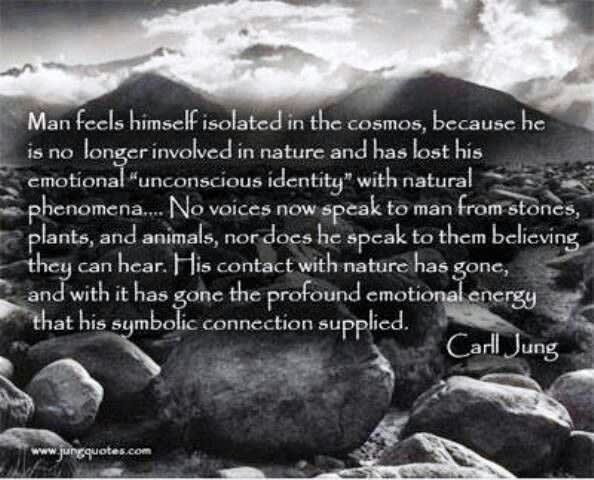絵画:第75回沖展の絵画部門e-no新人賞、城間キノネさん
「しかし、まさに過去とのつながりの喪失、根こそぎにされたことこそが、文明の「不満」とそのような慌ただしさと性急さを生み出し、私たちが今よりも未来とそのキメラ的な黄金時代の約束に生きているということなのだ。 私たちの進化的背景全体がそれに追いついていないのです。」
~CG Jung Memories, Dreams, Reflections
"But it is precisily the loss of connection with the past, the uprootedness, which has given rise to the "discontents" of civilization and to such flurry and haste that we live more in the future and its chimerical promises of a golden age than in the present, with which our whole evolutionary background has not caught up."
~CG Jung Memories, Dreams, Reflections
A.
引用:
それにもかかわらず、私たちは、ルーツから遠ざかれば遠ざかるほど、ますます激しい暴力で私たちを未来へと押し流してしまう進歩の激流に陥っています。 一度突破された過去は通常消滅し、前進を止めることはできません。 しかし、過去とのつながりを失い、根こそぎ奪われた私たちは、文明の「不満」を生み、私たちが現在よりも黄金時代の未来に生きるような慌ただしさと性急さを生み出し、私たちの進化の背景全体がまだ追いついていない、そのキメラのような約束の中に生きている。 私たちは増大する不足感、不満、落ち着きのなさに駆り立てられて、新しいものに衝動的に飛び込みます。 私たちはもはや自分の持っているものではなく、約束に基づいて生きています。もはや今日の光の中でではなく、最終的には正しい日の出をもたらすと私たちが期待している未来の暗闇の中で生きています。 私たちは、より良いものはすべて、より悪いものを代償として購入されるということを認めません。 たとえば、科学の最も輝かしい発見が私たちにさらす恐ろしい危険については言うまでもありませんが、より大きな自由への希望は国家への奴隷化の増大によって打ち消されてしまいます。 私たちの父や祖先が何を求めていたのかが理解できなくなると、自分自身も理解できなくなります。そのため、私たちはその個人からそのルーツと指導的本能を奪い取り、その人が大衆の中の一部となり、ただ支配されるだけになるように全力で手助けします。 ニーチェが重力の精神と呼んだものによって。
進歩による改革、つまり新しい手法や機器による改革は、もちろん最初は印象的ですが、最終的には、それらに、そしていずれにしても高いお金を払ったものであるかぎり、疑わしいものになります。 それらは決して人々全体の満足感や幸福感を高めるものではありません。
ほとんどの場合、それらは、生活のテンポを不愉快に加速させ、これまでよりも私たちの時間を短縮する迅速なコミュニケーションのような、存在を欺く甘美なものです。
~CG Jung、MDR、236 ページ。
A.
Citation:
Nevertheless, we have plunged down a cataract of progress which sweeps us on into the future with ever wilder violence the farther it takes us from our roots. Once the past has been breached, it is usually annihilated, and there is no stopping the forward motion. But it the loss of connection with the past, our uprooted-ness, which has given rise to the "discontents" of civilization and to such a flurry and haste that we live more in the future of a golden age than in the present, and its chimerical promises with which our whole evolutionary background has not yet caught up. We rush impetuously into novelty, driven by a mounting sense of insufficiency, dissatisfaction, and restlessness. We no longer live on what we have, but on promises, no longer in the light of the present day, but in the darkness of the future, which, we expect, will at last bring the proper sunrise. We refuse to recognize that everything better is purchased at the price of something worse; that, for example, the hope of greater freedom is canceled out by increased enslavement to the state, not to speak of the terrible perils to which the most brilliant discoveries of science expose us. The less we understand of what our fathers and forefathers sought, the less we understand ourselves, and thus we help with all our might to rob the individual of his roots and his guiding instincts, so that he becomes a particle in the mass, ruled only by what Nietzsche called the spirit of gravity.
Reforms by advances, that is, by new methods or gadgets, are of course impressive at first, but in the run are dubious long they and in any case dearly paid for. They by no means increase the contentment or happiness of people on the whole.
Mostly, they are deceptive sweetenings of existence, like speedier communications which unpleasantly accelerate the tempo of life and leave us with less time than ever before.
~CG Jung, MDR, Page 236.
DeepL翻訳
A.
引用
それにもかかわらず、私たちは進歩の激流を下ってきた。進歩は、私たちのルーツから遠ざかれば遠ざかるほど、ますます荒々しい暴力で私たちを未来へと押し流す。ひとたび過去が破られれば、それは通常消滅し、前進を止めることはできない。しかし、過去とのつながりを失い、根こそぎ奪われた私たちは、文明の「不満」を生み、私たちが現在よりも黄金時代の未来に生き、私たちの進化の背景全体がまだ追いついていないそのキメラ的な約束に生きるような慌ただしさと性急さを生み出している。物足りなさ、不満、落ち着きのなさに駆られながら、私たちは目新しいものへと軽率に突進していく。私たちはもはや、今あるものに頼らず、約束に頼って生きている。私たちは、より良いものはすべて、より悪いものと引き換えに購入されることを認識しようとしない。たとえば、より大きな自由への希望は、国家への奴隷の増加によって打ち消されるのであり、科学の最も輝かしい発見が私たちをさらす恐ろしい危険については言うまでもない。私たちの父祖や先祖が求めていたものを理解すればするほど、私たち自身を理解しなくなる。こうして私たちは、個々人からその根源と指針となる本能を奪い、ニーチェが「重力の精神」と呼んだものだけに支配される、塊の中の粒子となるよう、全力を尽くして手助けしているのだ。
進歩による改革、つまり新しい手法や小道具による改革は、最初はもちろん印象的だが、長期的には怪しげなものであり、いずれにせよ大きな代償を払うことになる。それらは決して人々の満足感や幸福感を高めるものではない。
たいていの場合、それらは存在を欺く甘美なものであり、よりスピーディーな通信のように、人生のテンポを不愉快に加速させ、私たちに以前よりも少ない時間を残すものなのだ。
~CGユング、MDR、236ページ。
ファンタージエンに虚無が広がれば広がるほど、それだけ人間世界に虚偽が氾濫し、そしてほかならぬそのせいで、せめてひとりでも人の子がきてくれはしないかという望みが、刻一刻うすらいでゆくのだ。これはもう悪魔の環だった。 『はてしない物語』 ーミヒャエル・エンデ
「欲望が外側のものから離れた人は、魂の場所に到達します。
もし魂を見つけられなければ、虚無の恐怖が彼を襲い、その恐怖が彼を何度も何度も鞭で打ちつけ、必死の努力と世界の虚しいものへの盲目的な欲望に駆り立てられることになる。」
カール・ユング、 『赤の書』
絵画:ウィリアム・ブレイク 墓の奥を探る魂
William Blake: The Soul Exploring the Recesses of the Grave
He whose desire
turns away from outer things reaches the place of the soul.
Carl Jung Red Book
人生後半の私の患者たち、つまり35歳以上の患者の中で、最後の手段として人生に対する宗教的な見方を見つけることが問題ではなかった人は一人もいませんでした。彼ら全員が病気になったのは、あらゆる時代の生きた宗教が信者に与えてきたものを失ったからであり、宗教的見解を取り戻さなかった人は誰も本当に癒されていないと言っても過言ではありません。
~CG ユング、心理療法士、または聖職者。 CW 11: 心理学と宗教: 西と東、パラ。 509.
Among all my patients in the second half of life — that is to say, over thirty-five — there has not been one whose problem in the last resort was not that of finding a religious outlook on life. It is safe to say that every one of them fell ill because he had lost what the living religions of every age have given to their followers, and none of them has been really healed who did not regain his religious outlook.
~C.G. Jung, Psychotherapists or the Clergy. CW 11: Psychology and Religion: West and East, para. 509.
CG ユングが語る象徴的な人生
ご存知のとおり、人間は象徴的な生活を必要としています。ひどく困っています。 私たちはありふれた、普通の、合理的な、または非合理的なことだけを生きています。 。 。 しかし、私たちには象徴的な人生はありません。 私たちは象徴的にどこに住んでいますか? 私たちが人生の儀式に参加する場所以外にはありません。 。 。 。
インドで見られるように、家のどこかに儀式を行うコーナーはありますか? そこの非常に簡素な家であっても、少なくともカーテンで仕切られた一角があり、そこで家族のメンバーが象徴的な生活を営むことができ、そこで新たな誓いや瞑想を行うことができる。 私たちにはそれがありません。 私たちにはそのようなコーナーはありません。 もちろん私たちには自分の部屋がありますが、いつでも電話がかかってくるので、いつでも準備ができていなければなりません。 時間も場所もありません。
私たちは象徴的な命を持っていません、そして私たちは皆、象徴的な命を非常に必要としています。 象徴的な人生だけが魂の必要性、つまり魂の日々の必要性を表現できるのです、念のため! そして、人々にはそのようなものがないため、この工場、つまり「それ以外の何ものでもない」この恐ろしく平凡で骨の折れる生活から決して出ることができません。 。 。 。 すべてが平凡です。 すべては「ただ」であり、それが人々が神経質になる理由です。 彼らは単にすべてのことにうんざりしており、その平凡な生活にうんざりしているため、感覚を求めています。 彼らは戦争さえ望んでいます。 彼らは皆戦争を望んでいる。 戦争が起こると彼らは皆喜ぶ。 彼らは言います、「天に感謝します。今、何かが起こります。私たちよりも大きな何かが起こります!」
これらのことはかなり根が深いので、人々が神経質になるのも不思議ではありません。 人生は合理的すぎる。 私が何か他のものであり、その中で私が自分の役割、人生という神聖なドラマの俳優の一人としての役割を果たしているという象徴的な存在はありません。
1939年にカール・ユングがロンドンの司牧心理学ギルドで行ったセミナー講演より
C.G. Jung on The Symbolic Life
You see, man is in need of a symbolic life – badly in need. We only live banal, ordinary, rational, or irrational things . . . but we have no symbolic life. Where do we live symbolically? Nowhere except where we participate in the ritual of life. . .
Have you got a corner somewhere in your house where you perform the rites, as you can see in India? Even the very simple houses there have at least a curtained corner where the members of the household can perform the symbolic life, where they can make their new vows or their meditation. We don’t have it; we have no such corner. We have our own room, of course, – but there is a telephone that can ring us up at any time, and we always must be ready. We have no time, no place.
We have no symbolic life, and we are all badly in need of the symbolic life. Only the symbolic life can express the need of the soul – the daily need of the soul, mind you! And because people have no such thing, they can never step out of this mill – this awful, banal, grinding life in which they are “nothing but.” . . . Everything is banal; everything is “nothing but,” and that is the reason why people are neurotic. They are simply sick of the whole thing, sick of that banal life, and therefore they want sensation. They even want a war; they all want a war; they are all glad when there is a war; they say, “Thank heaven, now something is going to happen – something bigger than ourselves!”
These things go pretty deep, and no wonder people get neurotic. Life is too rational; there is no symbolic existence in which I am something else, in which I am fulfilling my role, my role as one of the actors in the divine drama of life.
From a seminar talk given by Carl Jung in 1939 to the Guild for Pastoral Psychology, London
CG ユングが語る象徴的な生命
中心となる神話の喪失は真に終末的な状況をもたらし、これが現代人の状態です。








